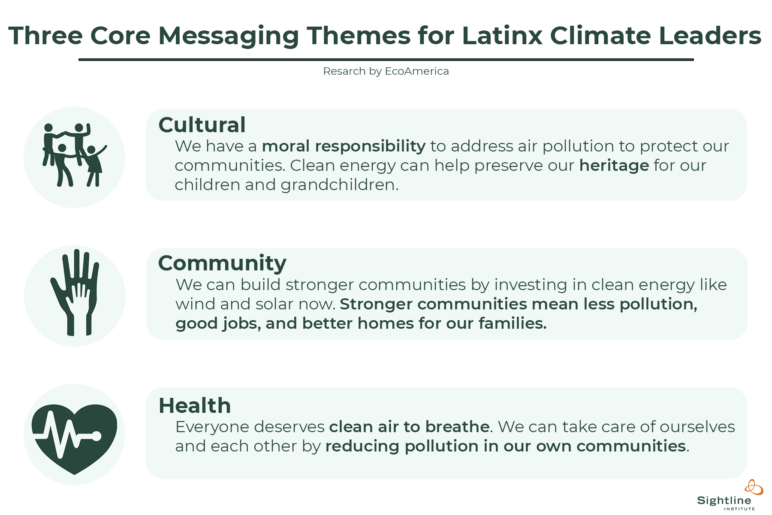Editor’s Note: We would like to acknowledge that the use of the term “Latinx” is a matter of personal, generational, and cultural preference.
Latinx communities make up 17 percent of the population of the US, and Latinx political and cultural power is essential for helping move America toward a clean energy future.
Polling conducted by EcoAmerica and produced in association with the Hispanic Association of Colleges and Universities reveals strong support among Latinos for climate solutions—much stronger, in fact, than American voters overall. Overwhelmingly, Latino voters know climate change is happening and believe that solutions are needed and can be achieved. 84 percent of those polled reported that they would be willing to personally take action to prevent damage to the climate. They also tend to believe solutions are compatible with jobs and the economy. And majorities support climate policy solutions like limits and fines on pollution.
Climate concern hits close to home. Nearly half of Latinx Americans live in the most polluted and climate-impacted communities in the US. Spanish-speaking Latinos display the highest levels of support for climate solutions, with 93 percent saying they are personally concerned about the impacts of climate change, compared to 80 percent for English-speaking Latinos and 61 percent for Americans overall. EcoAmerica found that 70 percent report damage and harm from extreme weather.
EcoAmerica and its partners have developed a message guide geared toward messengers and audiences who identify as Latinx. The message testing was conducted in three phases— landscape and language analysis, focus groups, and an online survey—and in Spanish and English. It was designed to ensure the language that emerged was generated by participants and that the talking points respect and incorporate Latinx values into climate messaging. Latinx voters already express a high level of concern about global warming and support for solutions, so the goal is to boost urgency and encourage action.
It’s important to note that although these frames were produced for Latinx leaders speaking to Latinos, communicators should be inclusive and refrain from singling out Latinos as a separate group. Talking about “we” is more personal and engaging than “you” or “I.”
The values that participants identified as important considerations for taking climate action include:
- Moral responsibility—concern for the impacts of climate change on future generations
- Health (harmful pollution)
- Family and children
- Optimistic aspirations
- Orientation toward the future
- Personal finance—saving money is better than reducing costs
Taken together, these values shape three core messages that prove compelling and motivating to the US Latinx community:
1. Cultural: centered on values of care and optimism. Positions climate action as a moral responsibility and embodies a can-do tone to strengthen support for clean energy.
Messaging Example: Family is everything. We give thanks for the blessings we have and work hard to provide for our family and ensure that our children and grandchildren have a better life than we do. As part of this, we have a moral responsibility to preserve the air, water, and land in our communities for our children and future generations. We need to make our voices heard to see the changes we need. We need to take steps to reduce the pollution that contaminates the air we breathe, damages our climate, hurts our communities, and threatens the natural beauty around us. We need to move beyond the failed ways of the past and embrace clean energy like wind and solar power that can help us preserve our heritage for our children and grandchildren.
2. Community: Brings the values family, health, optimism, and personal finance closer to home. Focusing on local impacts and solutions helps make achievement feel possible.
Messaging Example: We all want to live in the best communities for our families. Our local communities are learning that smart investments in clean energy like wind and solar build stronger communities, because it provides a healthier environment, makes energy more affordable, and creates jobs that provide a good living. We see our changing climate, and we can’t just wait for others to solve our problems. Right now, in our own communities, we can reduce pollution, improve our health, start new businesses, and create good jobs by producing and using clean energy. We can protect our cities by leaving dirty fuels behind. A community with sustainable solutions is the place we want to call home for our families and the next generation.
3. Health: connects the values of family, children, and health as personal benefits to solutions. Provides real-lived examples to relate climate impacts to human health.
Messaging Example: Our families’ health matters. When the American Lung Association tells us toxic pollution in the air we breathe affects the health of nearly half of us in our communities, and even more so in Latino communities, we need new solutions. It seems like kids now carry inhalers as often as lunch boxes. Seniors are stuck inside when the weather shifts dramatically to extreme heat or freezing cold. Thankfully, we have a plan for a healthier future. We can move away from the dirty fuels that make us sick and shift toward safe, clean energy, like wind and solar. We can reduce pollution in our communities. Each breath we take should be a healthy one. Let’s address this problem now, because caring for the climate means caring for ourselves.

Thanks to Sightline communications associate Kelsey Hamlin for her work on the graphic.

